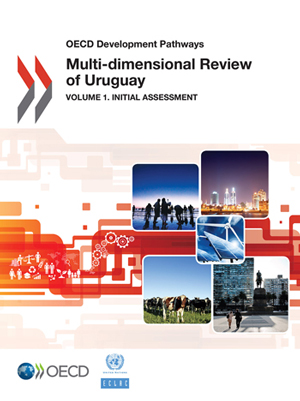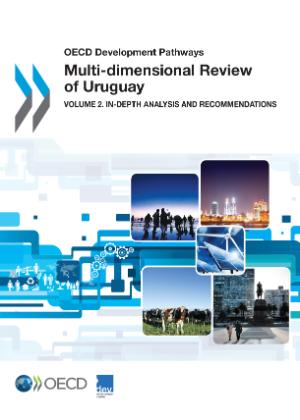Multi-dimensional Review of Uruguay - Vol. 1. Initial Assessment
Uruguay has made remarkable progress over the past decade. Stable macroeconomic policies and a favourable external environment have permitted brisk growth and the financing of social policies. Substantial improvements in several dimensions of human well-being have occurred during this period, alongside considerable reductions in external risks. The conditions ahead, however, may present challenges to maintaining performance. Overcoming these challenges will require finding the appropriate balance between long run objectives and macroeconomic and fiscal stability.
One of the main obstacles to economic growth is the insufficient and inadequate provision of human capital and skills. A number of challenges remain for education, which, together with fiscal policy, are key means of reducing inequalities and sustaining economic growth. In addition, Uruguay needs to address labour shortages to avoid constraints on future growth, especially as exports become more skills-intensive. It is important to orient social policies and expenditures towards the most vulnerable groups.
Read the full publication / en español
Executive Summary
Facts and figures of Uruguay
Chapter 1. How’s life in Uruguay? Historical performance and an assessment of well-being outcomes
Chapter 2. Structural trends and economic performance in Uruguay
Chapter 3. Inequalities in Uruguay
Chapter 4. Macroeconomic policies for sustaining growth and social inclusion in Uruguay
Multi-dimensional Review of Uruguay - Vol. 2. In-depth Analysis and Recommendations
The second volume of the Multi-dimensional Review of Uruguay explores three main policy areas for future action to put Uruguay on a more sustainable and dynamic development pathway: designing a well-functioning strategy for international integration, overcoming the barriers to infrastructure development, particularly in the transport sector, and strengthening the education and skills systems.
Uruguay has made important progress in its integration into the global economy, participating more actively in global value chains and creating the conditions for attracting foreign investment and boosting productivity. However, further progress could be made in broadening diversification while, at the same time, an inflexible regulatory framework and sub-optimal use of trade agreements are curbing Uruguay’s integration. According to the report, the country should focus on diversifying trade across new markets while introducing greater flexibility into its regulatory profile, especially for its service sector. It is vital to improve regulatory coherence in areas such as competition policy, intellectual property rights and investment if it is to achieve a deep integration into global value chains. At present, even taking the current Mercosur context into account, Uruguay could make better use of the international trade and investment agreements in which it participates.
Press release:
English: International integration, infrastructure and investment in education are the priorities for Uruguay
Read the Executive summary / full publication
Chapter 1. Assessment and recommendations
Chapter 2. International integration, investment and services in Uruguay
Chapter 3. Transport infrastructure for development in Uruguay
Chapter 4. Towards greater equity in education in Uruguay



